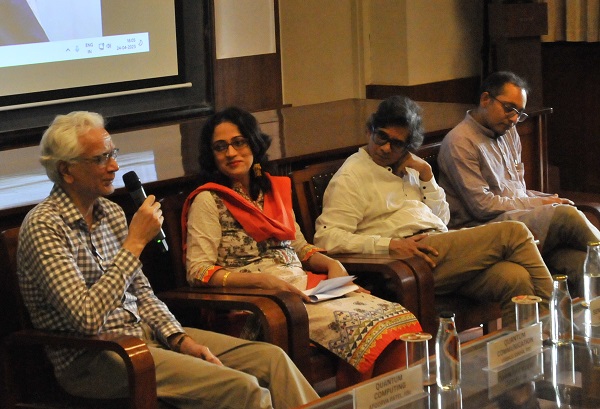
Bangalore, April 24, 2023: The Rs. 6,003.65 crore National Quantum Mission (NQM) will allow Indian scientists develop indigenous technology, systems, devices and materials required to propel the Research and Development (R&D) in Quantum Technology. It will take India among the top global nations working in this field, Dr. Akhilesh Gupta, in-charge, NQM and Secretary, Science and Engineering Research Board (SERB) at DST said yesterday.
He was speaking virtually during a press conference organised by the Raman Research Institute (RRI) in Bengaluru to discuss about NQM. Several scientists and experts working in this field in Bengaluru were present on the occasion.
Last week, the Union Cabinet’s approved NQM thus paving the way for the country’s leading scientific research institutions to enter the mission-mode. The Department of Science and Technology (DST) will steer the mission during 2023 – 2031.
“In the past, India had adopted technologies developed abroad and implemented them here, but NQM has a distinction. NQM is the only mission, so far, wherein Indian scientists will develop our own technology. Though India will need international cooperation, it will be mainly for knowledge exchange," he said
“All countries, who are presently involved in ​quantum technology, are in their Research and Development (R&D) stage and India is joining them”, he added.
​Prof. ​Sadi​​q​ Rangwala​ from RRI said that NQM​ will allow a greater robust implementation and bring-in collaborations with labs involved in research in Quantum Technology: “ In a few years, NQM can become a root ​for the emergence of Quantum Technology​-enabled​​ devices​.”
4 hubs
Under NQM, there will be four Thematic Hubs (T-Hub) operating for each of the four verticals -- Quantum Computing, Quantum Communication, Quantum Sensing and Metrology and Quantum Materials and Devices.
DST will formally call for proposals to decide the establishment of T-Hubs in the country. T-hubs will be a consortium of research institutions. Based on the expertise of the institute, they will steer the research under the respective vertical, added Dr. Gupta.
“ India is now ready to work in the field of Quantum Technology. Many labs and institutions in India have already been working in some areas and their works have been tested by agencies like the Indian Space Research Organisation (ISRO) and the Defence Research and Development Organisation (DRDO)," he said.|
​Identifying and development of materials suitable for ​Q​uantum ​Technology remains key in propelling the R&D in this emerging field, said Prof. Subhro Bhattacharjee​ from the ​​I​nternational ​Centre for ​Theoretical S​ciences (ICTS).
" This mission will help all labs in the country to focus on ( identifying ) required materials with desired properties ​that ​can act as a platform of quantum devices," said Bhattacharjee.
​Prof. ​Urbasi Sinha, ​who heads the Quantum Information and Computing lab at the RRI said, " We have been actively working on Quantum Communication for the past several years. The goal is to connect the whole country using QKD and satellite based communication. ​NQM will take quantum research and technology to the next level​.​"
​Senior quantum physicist from the Indian Institute of Science, Prof. ​Apoorva Patel​, said, " Quantum Technology will be highly problem-specific and cannot be applied for general problems."